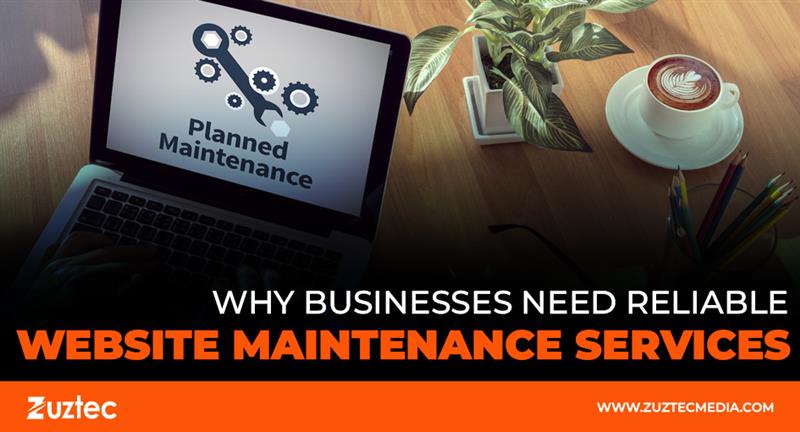
Why Businesses Need Reliable Website Maintenance Services
A website is more than just an online presence in the modern digital world; it’s frequently the first thing a potential customer sees about your company. Creating a website that is both professional and aesthetically pleasing is vital, but so is keeping it up-to-date over time. This is where website maintenance services are useful. These services ensure that your site remains functional, secure, and up-to-date, helping your business avoid problems that could harm your reputation or performance.
Websites need regular updates to perform efficiently. From software patches to plugin updates and fixing broken links, routine maintenance is essential. Ignoring it can lead to performance issues, poor user experience, or even security breaches. A neglected website might load slowly, display errors, or become vulnerable to cyberattacks. Any of these issues can cause users to leave, which directly affects your business goals.
Many small businesses think maintenance is a one-time task or something to handle only when issues arise. Proactive web maintenance services help avoid emergencies, reduce downtime, and improve long-term site performance. Whether it’s fixing bugs, improving speed, or ensuring compatibility with new browsers and devices, regular maintenance adds real value.
This article explores what web maintenance services include, why they matter, and how to choose the right provider. Understanding the role of ongoing website care helps business owners, marketers, and web teams make smarter decisions and keep their sites working smoothly, all year round.
Website Maintenance Services Keep Your Site Secure And Updated
These services cover a range of tasks that keep your website running smoothly, securely, and efficiently. These services are essential for businesses that want to avoid downtime, data loss, or security risks. Maintaining your site isn’t just a technical job—it’s a key part of managing your brand’s digital presence.
A good maintenance plan typically includes regular software updates. This could entail installing the most recent versions of the themes, plugins, and content management system (CMS). These updates patch security holes and fix bugs in addition to adding new features. Without them, your website may become slow, unresponsive, or vulnerable to hacking.
Another important task is website backups. Regular backups ensure that if something goes wrong, like a server crash or malware infection, you can quickly restore your site without starting from scratch. Maintenance services also check for broken links, outdated content, and compatibility issues with different browsers and devices.
Security monitoring is another crucial part of website maintenance. Service providers scan your site for viruses, malware, and vulnerabilities. If something suspicious is detected, they take immediate steps to resolve it. This helps protect customer data and maintain trust in your business.
How Regular Maintenance Helps Business Performance
Many business owners invest heavily in building a great website but forget the importance of keeping it in good shape. Web maintenance services help you get more value from your online platform and keep your business running smoothly.
One major benefit is improved website speed. Maintenance services often include performance checks that identify and fix speed issues, like outdated scripts, large images, or poor server configurations. Faster websites lead to better user experience, longer visit durations, and more conversions.
Another advantage is better SEO performance. Search engines reward websites that load quickly, are mobile-friendly, and have no broken links. Regular maintenance ensures your website meets these standards, giving it a better chance of ranking well in search results.
In the middle of your business journey, having reliable website maintenance services ensures fewer interruptions and more stability. When your website is regularly updated and tested, you can focus on your core business activities without worrying about technical failures. It also means less time spent troubleshooting and more time serving your customers.
Choosing The Right Provider For Your Website’s Needs
First, evaluate their expertise. Look for providers with experience managing websites similar to yours—whether it’s an e-commerce store, blog, or corporate site. Ask about the platforms they support (such as WordPress, Shopify, or custom-built sites) and what types of updates they handle. A good provider will offer more than just fixes; they’ll suggest improvements and alert you to potential issues before they become problems.
Second, consider their response time. You need a team that’s available when you need them. If your website crashes or gets hacked, how quickly can they restore it? Reliable providers offer clear service level agreements (SLAs) that define how quickly they respond to issues. Some even provide 24/7 support for emergencies.
Third, review the services included in their plans. Basic plans might only offer updates and backups, while premium options can include SEO monitoring, performance tuning, and detailed reporting. Choose a plan that fits your current needs but also allows you to scale as your business grows.
However, website maintenance services are essential for keeping your site secure, functional, and up-to-date. From protecting your data to enhancing user experience, these services play a crucial role in your website’s success. Investing in reliable maintenance means fewer problems, better performance, and more peace of mind for your business.

